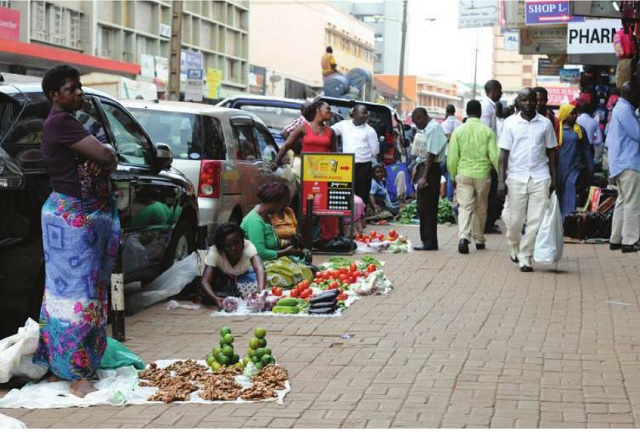
Kampala, Uganda | THE INDEPENDENT | Herman Ssegawa, 40, sits on a small mat along Namirembe Road, offering pegs displayed on a wooden surface with lined boxes. He beckons customers to purchase from his street stall, conveniently located opposite Kikuubo business lane.
For over a decade, Ssegawa has engaged in this trade, purchasing pegs at wholesale prices from Kikuubo and reselling them to pedestrians at a small profit. On an average day, he generates sales worth 30,000 Shillings, utilizing his initial capital of 300,000 Shillings.
Through this occupation, Ssegawa has been able to build a house and fulfill various responsibilities as a father and husband, including paying for his children’s education. However, he constantly lives in apprehension due to the presence of law enforcement officers who frequently threaten him with eviction. But he vows never to relent.
It is highly unlikely for a day to pass in Kampala without street vendors engaging in confrontations with law enforcement personnel from the Kampala Capital City Authority (KCCA). Vendors operating on streets like Allen Road, William Street, Nakivubo Mews, Namirembe Road, and others are often viewed as disorderly group that congests the streets.
These activities are deemed detrimental to the objective of developing a smart city, according to the authorities. The former KCCA Executive Director, Jennifer Musisi, is particularly remembered for her approach of using force, arrests, and confiscation of merchandise to remove vendors from the streets in 2012. While her strong measures yielded temporary results, they were met with criticism from the public and opposition politicians in Kampala who accused the Authority of poor planning and witch-hunting the urban poor seeking a livelihood.
A popular musician turned politician, Robert Kyagulanyi, also known as Bobi Wine, even composed a song titled “Tugambire ku Jennifer” (Appeal to Jennifer), appealing to Musisi to halt the forceful eviction of vendors in an effort to bring order to the city. However, despite ongoing enforcement efforts to clear the streets of vendors for over a decade, the status quo remains.
According to Dr. Andrew Gilbert Were, an Urban Planner and lecturer at Makerere University, the city authority should adopt a different approach towards street vending instead of persisting in its attempts to eradicate it. Dr. Were, who has recently carried out a study on the chronicle issue which is slowly spreading to other developing cities and towns, believes that street vendors should be acknowledged for their crucial role in the distribution of goods and services within the value chain.
Backed with research, he adds there is no major crisis on the streets that warrants the continuous deployment of officers by KCCA to evict street vendors.
According to the findings of Dr. Were’s study, over 60 percent of the 142 street vendors interviewed operate on the streets because it’s the only available place for them to eke a living. The majority of the vendors also report having limited capital, some as low as 30, 000 shillings which may not sustain them in stationed markets while others operate on social capital through getting products on credit and paying up after sale.
Beyond the above influences, there are underlying factors that contribute to street vending and its significance in the broader urban economy. This involves multiple participants such as arcade managers who rent out space to street vendors, wholesale traders from whom street vendors purchase their merchandise, and customers who benefit from the convenience of swift shopping while on the go.
Kampala’s streets were designed as a destination based but the public has revolutionized them to operate as markets for quick shopping hence attracting the wrath of the authorities. It is not just street vendors stationed at specific spots on particular streets downtown but hawkers staged on busy roads where traffic jam is a common occurrence.
Dr. Were says that City planners should rethink street use to accommodate emerging uses and incorporate them into the planning process. If the streets have become popular as marketplaces, he recommends redefining them from being solely transportation routes into vibrant markets. He says markets are both stationary and mobile, and that should be appreciated by city planners.
However, Villey Agaba, the Physical Planner for Kampala Central division at KCCA, strongly opposes the idea of allowing vendors to continue operating on the streets. According to Agaba, it is essential for cities to uphold standards that promote orderliness and promote the Smart city agenda of the authority. He argues that vendors are a significant contributing factor to congestion and criminal activities in downtown areas and thus should not be left to operate there.
Agaba firmly believes that vendors should utilize designated market spaces such as Wandegeya and Usafi instead of occupying the streets.
But Dr. Were hence says that the city authorities should be seen to plan for small-scale traders rather than only large-scale investors who are often allocated chunks of land in town to set up upscale businesses such as arcades while displacing the small-scale traders.
He urged the authority to provide an enabling environment for street vendors to operate in an orderly manner on the streets. He says, the authority should legislative street vending activities, establish effective street leadership, set and enforce vendor licensing and designate specific streets, times, and days for street vending.
Dr. Were says that spaces such as the Nakivubo channel can be covered and allocated to street vendors to run their errands.
In March 2013, KCCA opened Usafi Market in Kalitunsi, Mengo Kisenyi, Central Division, as an alternative working space for street vendors. However, many vendors soon abandoned the market due to limited customer traffic, while others used the stalls as storage spaces for their merchandise.
In 2022, KCCA identified land near Ggwanda Mall in Central Division and in Kaleerwe, Kawempe Division for vendors to construct makeshift structures and operate from. Unfortunately, this initiative has also failed to yield the desired results, as vendors continue to operate on the streets.
Isma Mubiru, the Chairman of the Fuba Tukole Hawkers and Vendors Association, has voiced dissatisfaction with both offers, claiming they were made in bad faith. According to Mubiru, vendors were required to pay 80,000 shillings to secure space and construct makeshift structures, which many cannot afford.
He also expressed concerns about the idea of vendors constructing their own market, questioning how they would be protected from the challenges faced by previously privatized markets like Onino and Kisekka, which were later repossessed by the government. Mubiru argues that their street operations should be formalized instead, as they are already burdened with the necessary licenses.
According to critics, the strategy employed by KCCA to eliminate street vendors has proven unsuccessful in previous attempts. They argue that a different approach should be pursued, one that seeks a win-win situation between KCCA and the vendors.
This line is also famous among the Elias Lukwago-led political wing which argues that such could involve the establishment of a law or regulation that effectively governs street vending, allowing vendors to operate within specified guidelines while maintaining order and addressing concerns related to congestion and criminal activities.
City Lord Mayor Erias Lukwago has often argued that Cities grow with people and that fighting the urban poor off the streets does not warrant a smart city. Drawing examples from countries with a streamlined street vending industry like China and India, Lukwago insists that KCCA makes the City more accommodating to street vendors and hawkers instead of evicting them.
He has always advocated for a legal framework to provide for gazetting of streets for vending, vending time, and licenses for vendors. In 2019, KCCA drafted a bill to introduce a Street Trade Ordinance which would allow orderly hawking and vending on the streets but has never been concluded. It was brought to the KCCA council for the first reading and forwarded to divisions for consultations with stakeholders.
The bill provides for licensing of street vendors and hawkers in the five divisions of Kampala. Street vendors and hawkers operating the Central Business District would pay an annual license of 210,000 Shillings and 112500 Shillings respectively while those from the outskirts, mainly in divisions of Kawempe, Nakawa, Lubaga, and Makindye would pay 78,750 Shillings and 60,000 Shillings respectively. The bill also suggests uniforms for street vendors and hawkers depending on divisions. Since the ordinance is not yet in place, running battles between KCCA and vendors are still continuing.
*****
URN
 The Independent Uganda: You get the Truth we Pay the Price
The Independent Uganda: You get the Truth we Pay the Price




My dear Ugandans, I have transversed across our country Uganda and noticed that streets vendoring exist in all Towns, Municipals and Cities.Therefore it’s a general road traffic problem in Uganda. This is contributing to the many road accidents in the Country thought we all know why they do street vendoring but it’s more dangerous to sell on the streets if compared to the amount of accidents they get. Therefore, I agree with the enforcement of the new bill which says street vendors must be over taxed for using public streets for business, I also suggest that the government must reconsider redesigning Urban roads using six lanes. The two last lanes on both sides must be reserved for those stubborn street vendors, the two middle lanes should be allocated to cyclists and the two central lanes used by vehicles strictly.I also suggest that anybody knocked while selling on the streets should not be compensated. I also request the local leaders to stop organizing weekly markets and auctions on the streets. I would like this opinions to be published for Open discussion.thankyou. Paul Kawimbo – Master degree in Development